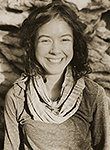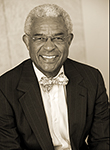Dedicated to the memory of Thomas B. Gay, educator, painter, poet, friend.
(read more about Thomas B. Gay)
Each spring we use this reading loop to bring to your attention writers and artists whose work you may be encountering for the first time. In this issue, the group includes several who have already made their way to other lists, anthologies, and small presses acclaiming their remarkable work. We expect that you will be glad to discover them now—and to hear of them again later in their careers, as you no doubt will.
| Jacqueline Balderrama | ||
| At least two of Jacqueline Balderrama’s nuclear Texas trio are kin. A doting father, “cleaning out his daughter’s car,” sees only the “mess, beautiful, of silver wrappers, hairbands, emptied yogurt bowls.” This girl may or may not be related to the woman we glimpsed “in the back of [an] exchange shop,” the “bayou grass” blowing in. Add to these the musing voice of “Accountability for Your Blind Sheep,” observing “a homeless man pass twice, / and an amputee practicing in the heat with her walker” for a tutorial in the practice of restraint as solace. |  |
|
| Max Berwald | ||
| Max Berwald’s “Preventative Medicine” uses dialogue as its primary engine to present two young expats caught in the currents of a late night bar scene in Beijing. The city seems to impose a temporal dislocation that reduces the characters to the names of their beers and the pop tunes broadcasting through various sound systems. Against this affectless environment, Berwald focuses on romantic blunders and explores confusion in pursuit of connection: “He can’t tell if he’s passed a test or failed a test or if they’re just being honest with each other.” |  |
|
| Anna Caritj | ||
| Anna Caritj’s West Virginia couple welcome their Berkeley freshman home for Thanksgiving, but they have not accounted for the velocity of change, that moving at the same speed means little when you’re moving in different directions. The result: estrangement. A son who thinks, “So this was home . . . as if seeing it for the first time,” but who thrills at the presence of an old girlfriend across the street. More substantial than his parents’ lawn flamingos: “She was his—or she would be, at least. He would take her out and put her wherever he pleased.” |  |
|
| Dorothy Chan | ||
| Dorothy Chan’s multipart ekphrastic work, “Composition,” enacts a fused homage to the over-the-top sensuality of artists like Ren Hang and Marilyn Minter. Chan’s series, like the “maelstrom” of Kandinsky’s IV, marries the world of art and eroticism, unabashedly admiring “two axes of flesh, joined by a vertex of architecture— / two axes of flesh, gazing at the white sky.” Coupled (pun intended) with Chan’s swift syntactical jump cuts, shooting scripts of “the final seduction, the final tease,” beware: this work may cause heavy breathing. |  |
|
| Eman Hassan | ||
| Kuwaiti-born poet Eman Hassan reminds us that sometimes the darkness swallows us, even in broad daylight, demanding, “Is there another lunatic who says War / makes for a better person?” From a young woman “still drunk with [her] first lover’s name” to an aid worker fleeing the conflagration of her homeland, Hassan’s spare, vivid depictions of coming of age amidst the violence illuminate the intersection of individual and national identity, revealing how, in times of great crisis, we are often thrust into our strongest and most authentic selves. |  |
|
| Larry Palmer | ||
| Larry Palmer grew up with ten siblings in Arkansas and St. Louis, and his memoir-in-progress summons each of those siblings in turn as guides through his memories. “Urshel: The Beautiful Lost Sheep” looks at the brother who went away when Palmer was four years old, leaving one morning “with just the shirt on his back,” and who unexpectedly returns years later for their father’s funeral. Palmer, the other brother who left, stands as the child who listened, unnoticed, and has chosen narrative as the agent that can freeze time and articulate affection. |  |
|
| Emily Skaja | ||
| Emily Skaja’s richly textured word-surfaces mirror the processes by which disappearance transforms us. A woman whose engagement has ended badly must break the news again and again to her grandmother, whose mind has stalled somewhere pre-1987. As she traverses the nursing home’s “herringbone floorboards” and the “corridor of Polish last names” each day, to “cradle the skull of a vulture to [her] cheek,” she remembers “how once I was near-bride at the not-altar how she sewed me / a blue marriage quilt & a dress.” So bitter, this becoming. |  |
Introductions texts appear in different sections of Blackbird but are organized in this alternative menu, a featured reading loop allowing easy navigation of related material.
A link to this “Introductions Reading Loop” menu appears at the bottom of every Introductions-related
page. You may also return to this menu at any time by visiting Features.